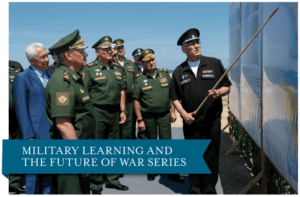|
The Russian Armed Forces are applying lessons learned from their experience in Syria to shape their development into a flexible and effective global expeditionary force. The Kremlin identifies its deployment to Syria as the prototypical example of future war—an expeditionary deployment to support a coalition-based hybrid war. The United States must understand this learning and adaptation to confront the Kremlin effectively.
This report makes several important and unique contributions to the field that are of great importance to US national security policymaking:
· The Russian military is using lessons learned managing an ad hoc coalition and proxy forces in Syria to inform preparations to coordinate formal coalitions in future wars including against the US and its allies.
· The Russian military assesses enabling its commanders to make better decisions faster than their opponents is increasingly the deciding factor in modern conflict, and is effectively leveraging learning from Syria to close its current capability gap with Western militaries by investing in modernized communications technologies and promoting creativity and initiative throughout its officer corps.
· The Russian Armed Forces have a unique conception of the future of war and necessary modernization priorities which create unique strengths and weaknesses, different from the modernization priorities of the United States or other competitors such as China.
· The Kremlin optimized its deployment to Syria to instill combat experience throughout the Russian military and is carrying out a generational effort to instill its lessons learned throughout the force.
The report further recommends that the United States should take several steps to counteract the application of Russia’s lessons from Syria to the global competition with the US. These are:
· The US should not underestimate the Kremlin’s intent and capability to conduct expeditionary deployments modeled on its intervention in Syria.
· The US must maintain a global, flexible force posture to confront the Russian military threat, which is not confined to Europe.
· The US should prioritize improving its ability to contest Russia’s improving command and control capabilities.
· The US and its allies should develop methods to disrupt enemy coalitions, a task the US has not had to conduct in recent wars.
· The US and its allies must avoid increasingly outdated assessments of Russian command culture rooted in the Soviet era to counter the increasingly flexible Russian military.
· The US and its allies should maintain sanctions pressure to deprive the Kremlin of the resources necessary to implement costly acquisitions programs.
Read the executive summary and download the full report here. |

